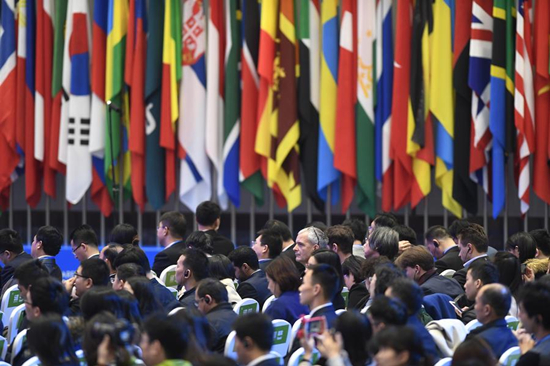Global digital blueprint a hot topic in Wuzhen

Representatives from China and overseas gather at the opening ceremony of the Fourth World Internet Conference on Dec 3, 2017. [Photo/Xinhua]
Wuzhen town in East China's Zhejiang province is known for its elegant bridges spanning a myriad waterways, as well as the houses with black roofs and white walls that line their banks.
However, since the annual World Internet Conference arrived to this ancient town in 2014, it has enjoyed the additional touch of technology.
This year, the Fifth World Internet Conference will be held in the town from Wednesday to Friday.
In recent years, China has seen a boom in its digital industries, especially artificial intelligence, cloud computing, big data, mobile internet and the digital payments.
The country has the largest number of internet users in the world, estimated at around 800 million.
Since 2014, the conference has followed the latest developments in the digital domain and held forums on topics with emphasis on deepening cooperation and enhancing mutual benefit. The summit also hosts dialogues for scientists in the field of frontier technology.
Delegates from China and overseas are invited every year to deliver keynote speeches on the internet's development.
For example, countries all around the world generally believe that the digital economy has become a new driver of global growth and represents the future. Guests who have attended the forum have also focused on sharing experiences and exchanging ideas on how to collaborate in promoting the healthy development of the global digital economy.
With the deepening of economic globalization, cultural diversity and the growth of social media, the internet is playing a bigger role in promoting human civilization. But at the same time, challenges such as imbalanced development, imperfect rules and protectionism in the field are also increasingly obvious.
The Wuzhen conference has established forums to discuss internet governance, cybersecurity and international cooperation to offer a platform upon which people can solve problems and build consensus.
The demand for stronger global internet governance has also grown in recent years, and people are wondering how developing and developed countries can work together to shape the global internet governance agenda in an equal and effective way. At the past conferences, delegates have reached a consensus that global internet governance should be based on a shared model, which means multilateral participation and discussion-based decision-making.
The internet is increasingly playing a role in influencing social conducts.
At past conference's forums, guests have said that people worldwide are increasingly expected to shoulder the social responsibility of spreading information on the internet and build a clean cyberspace.
Since 2014, the conference has set up nearly 60 forums, covering some 70 topics related to different aspects of the digital world. More than 1,000 guests have contributed their insights at such forums.

 Print
Print Mail
Mail
 20 Cultural Symbols
20 Cultural Symbols Why Zhejiang
Why Zhejiang Experiencing high-tech products at WIC
Experiencing high-tech products at WIC Zhejiang Release
Zhejiang Release Zhejiang News
Zhejiang News